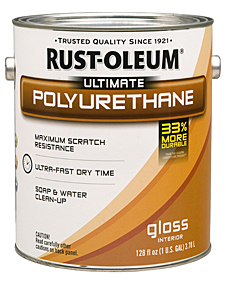
I need advice on refinishing a dining room table with a veneer top. The top has diamond patterns so there are changes in direction that could make sanding difficult. The veneer seems solid and tight with no lifting or warping. The only problem seems to be the finish wearing off. What would work best, sand or strip, and what would I use? The base and drop edges of the top seem to be hardwood. The base is pretty chewed up from my wheelchair but I think I can sand it out. My shop is small and in the basement (but well-equipped), so I prefer to work with water-based finishes but will carefully work with what you recommend. The table is often used as a game table so we would like a good hard finish. Would really appreciate any help you can offer. Thanks in advance. – Paul Nyberg
Chris Marshall: Since that tabletop is veneer, and you’re set on switching to a harder finish, I’d probably use a chemical stripper to remove the old finish instead of sanding it off. It would be a shame to accidentally sand through the top veneer if it is thin and still in good shape. If the ventilation in your shop isn’t great, try a citrus-based wood stripper so you can avoid other products with strong and dangerous solvents. The formulation may take longer to do the job, but it’d be the safer way to proceed in a basement shop space. As far as the new topcoat is concerned, if you like water-based finishes, you could certainly use a water-based polyurethane. That should give you a durable finish and good results on most hardwoods. Rust-Oleum® makes a new Ultimate Polyurethane varnish that’s water-based, and the company claims it is 33 percent more durable than the competition with “maximum” scratch resistance. You might consider giving it a try on your project.
Rob Johnstone: Chris is right on target for the best procedure for a full-out refinish. But if your main concern is that the finish is “wearing off, ” there might be another slightly easier option. This is especially true if the finish is not worn completely through. You might be able to apply a finish on top of the existing finish with pretty good results if you take a couple of steps. First, clean the surface with soap and water, drying it off completely. Then follow up with a good wipe-down with mineral spirits or TSP (trisodium phosphate). Then sand the surface with ultra-fine sandpaper and wipe off any swarf that results. If the surface looks good and uniform in color, you can apply a coat of dewaxed shellac as a base coat. After that you can apply almost any type of finish, polyurethane, lacquer or varnish. However, if the finish is completely worn through on the top, I think it would be best to get down to bare wood and apply a whole new film coat.





